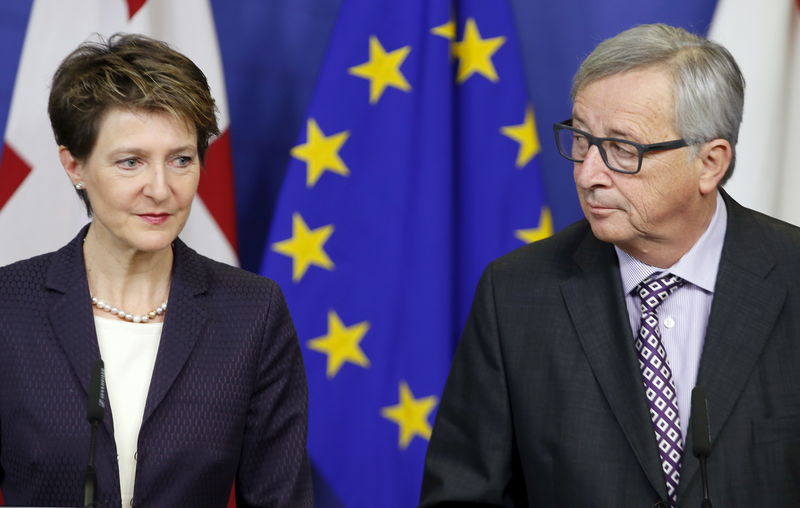By Brenna Hughes Neghaiwi
ZURICH (Reuters) - Switzerland and the European Union are looking into an escape clause in bilateral economic accords that could let Berne curb admissions of EU workers in cases of severe economic and social disruption, officials said on Monday.
The neutral Alpine state threatened this month to impose unilateral curbs on immigration should it fail to agree with the EU on limiting the influx into a small country where nearly a quarter of the population is now foreign.
Switzerland and its most important trading partner have been gridlocked over how to implement a binding 2014 Swiss referendum in favour of immigration quotas that would violate a bilateral pact guaranteeing freedom of movement for EU citizens.
Engineered by the anti-immigration Swiss People's Party (SVP) and driven by increasing fears for the country's vaunted stability, security and affluence, the referendum has jeopardised other Swiss-EU treaties that govern bilateral economic ties and stand or fall together.
Unilateral moves could lead the EU to scrap the entire package of bilateral accords, dealing a heavy blow to Swiss trade.
Both sides are examining a solution that would uphold Switzerland's constitutional obligation to implement the referendum while also maintaining the Free Movement of Persons act, the Swiss government said.
Swiss President Simonetta Sommaruga met European Commission President Jean-Claude Juncker and European Council President Jean Asselborn in Brussels on Monday to discuss the matter.
An article of the agreement stipulates that a joint committee may act to remedy severe economic or social problems at the request of either party.
"We're still trying to adopt rules on the basis of Article 14(2) of the Free Movement agreement that would allow us to bring our relations with Switzerland in order," Juncker said in his opening remarks to the meeting.
The Commission's legal experts were hard at work interpreting the notion of "severe economic and social problems" in the agreement, he added.
Switzerland has said it is prepared to see all or part of the various bilateral economic treaties set aside if no deal emerges soon, but Sommaruga's justice ministry said this would be a last resort.
"A unilateral safeguard clause would bring disadvantages for both Switzerland and the European Union," it said.
A study commissioned by the government found that exiting key bilateral pacts could cut output by up to 630 billion Swiss francs ($632 billion) by 2035, or as much as 7 percent of GDP.
Sommaruga said intensified talks showed a political will to reach a solution, but added that much work lay ahead.
The Swiss cabinet will present proposed legislation to parliament at the beginning of March, the Federal Justice and Police Department said, once Juncker reports to the governing Federal Council on any progress the Commission has made.

The Swiss government must implement new laws by February 2017 in order to meet the constitutional three-year deadline for enacting results of a popular referendum.